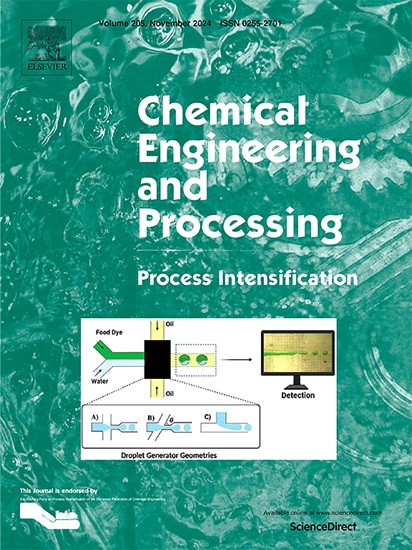Experimental investigation of mass transfer performance of a 3D printed novel structured packing – SpiroPak
IF 3.8
3区 工程技术
Q3 ENERGY & FUELS
Chemical Engineering and Processing - Process Intensification
Pub Date : 2025-02-01
DOI:10.1016/j.cep.2024.110132
引用次数: 0
Abstract
Traditional structured packings used in petrochemical engineering are commonly constrained by their corrugated and sectional design, which may limit their hydrodynamic and mass transfer capabilities under certain conditions, leading to a growing need for innovative packings to overcome these potential constraints. This research studies the effectiveness of a novel 3D-printed structured packing, known as SpiroPak, specifically in the context of carbon dioxide absorption. It is observed that SpiroPak outperforms conventional commercial packing in terms of mass transfer efficiency. Extensive experimental data was gathered to compare packing performances under varying process parameters. The study included parametric analyses to explore the impact of gas and liquid loads, as well as CO2 and NaOH concentrations. The results demonstrate that SpiroPak exhibits a 40 % more enhancement in mass transfer efficiency compared to conventional packing. Notably, the investigation into factors impacting SpiroPak's performance highlights that gas load has the most substantial impact on mass transfer compared to other operating conditions. This study presents a comprehensive comparison and benchmark of the packing performance, offering in-depth observations for optimising packing parameters and driving further advancements in this field.

求助全文
约1分钟内获得全文
求助全文
来源期刊
CiteScore
7.80
自引率
9.30%
发文量
408
审稿时长
49 days
期刊介绍:
Chemical Engineering and Processing: Process Intensification is intended for practicing researchers in industry and academia, working in the field of Process Engineering and related to the subject of Process Intensification.Articles published in the Journal demonstrate how novel discoveries, developments and theories in the field of Process Engineering and in particular Process Intensification may be used for analysis and design of innovative equipment and processing methods with substantially improved sustainability, efficiency and environmental performance.

 求助内容:
求助内容: 应助结果提醒方式:
应助结果提醒方式:


